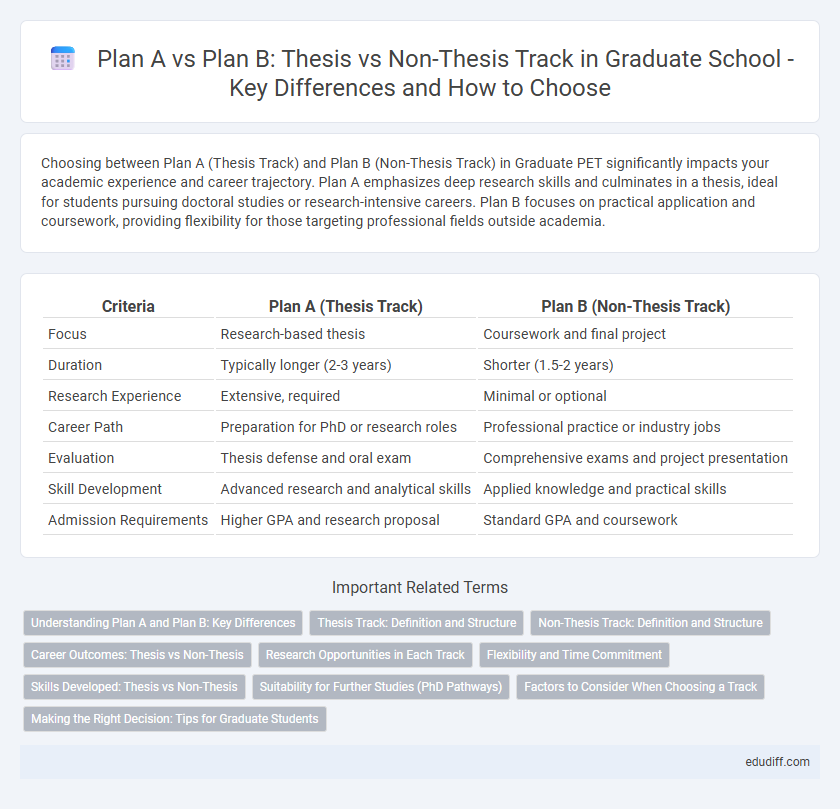Choosing between Plan A (Thesis Track) and Plan B (Non-Thesis Track) in Graduate PET significantly impacts your academic experience and career trajectory. Plan A emphasizes deep research skills and culminates in a thesis, ideal for students pursuing doctoral studies or research-intensive careers. Plan B focuses on practical application and coursework, providing flexibility for those targeting professional fields outside academia.
Table of Comparison
| Criteria | Plan A (Thesis Track) | Plan B (Non-Thesis Track) |
|---|---|---|
| Focus | Research-based thesis | Coursework and final project |
| Duration | Typically longer (2-3 years) | Shorter (1.5-2 years) |
| Research Experience | Extensive, required | Minimal or optional |
| Career Path | Preparation for PhD or research roles | Professional practice or industry jobs |
| Evaluation | Thesis defense and oral exam | Comprehensive exams and project presentation |
| Skill Development | Advanced research and analytical skills | Applied knowledge and practical skills |
| Admission Requirements | Higher GPA and research proposal | Standard GPA and coursework |
Understanding Plan A and Plan B: Key Differences
Plan A (Thesis Track) requires original research culminating in a thesis, emphasizing academic scholarship and preparation for doctoral studies. Plan B (Non-Thesis Track) focuses on coursework and a comprehensive exam or project, designed for practical application and career advancement. Understanding these distinctions helps graduate students choose a path aligned with their professional goals and research interests.
Thesis Track: Definition and Structure
The Thesis Track in graduate studies involves conducting original research culminating in a formal thesis, which demonstrates a student's ability to contribute new knowledge to their field. Structured around a research proposal, data collection, analysis, and defense, it requires close collaboration with a faculty advisor and adherence to institutional academic standards. This track enhances skills in critical thinking, academic writing, and research methodology, often serving as a foundation for doctoral studies or research-oriented careers.
Non-Thesis Track: Definition and Structure
The Non-Thesis Track in graduate programs offers an alternative to traditional research-focused pathways by emphasizing coursework and practical application over original thesis research. This structure typically includes advanced classes, comprehensive exams, and a final project or internship designed to demonstrate mastery of subject matter without the requirement of a formal thesis. The Non-Thesis Track caters to students seeking professional skills and knowledge applicable to industry roles rather than academic or research careers.
Career Outcomes: Thesis vs Non-Thesis
Graduate students pursuing the Thesis track often enhance their research skills and increase their chances of securing academic, research, or specialized industry positions due to extensive hands-on experience with original research. The Non-Thesis track generally prepares graduates for professional roles in industry or government by emphasizing practical skills, coursework, and internships over research, offering quicker degree completion with direct application to job markets. Career outcomes for Thesis graduates tend to involve higher opportunities in PhD programs and research-intensive roles, whereas Non-Thesis graduates frequently enter management, consulting, or technical positions requiring applied knowledge.
Research Opportunities in Each Track
The Thesis track offers extensive research opportunities, allowing graduate students to engage in original investigations, contribute to academic knowledge, and develop strong analytical skills under faculty supervision. The Non-Thesis track emphasizes practical application and coursework, providing fewer research opportunities but focusing on skill-building and professional development. Choosing between these tracks depends on a student's career goals, with the Thesis track aligning well with research-intensive roles and the Non-Thesis track suited for industry-oriented positions.
Flexibility and Time Commitment
Plan A (Thesis Track) demands a significant time commitment to original research and thesis writing, offering limited flexibility but valuable experience for academic or research careers. Plan B (Non-Thesis Track) provides greater flexibility with coursework and comprehensive exams, allowing students to complete their degree faster and adapt to professional or interdisciplinary goals. Choosing between Plan A and Plan B depends on balancing research interests, career objectives, and available time.
Skills Developed: Thesis vs Non-Thesis
The Thesis track cultivates advanced research, critical thinking, and academic writing skills through extensive investigation and original contribution to the field, preparing graduates for doctoral studies or research-intensive careers. The Non-Thesis track emphasizes practical skills such as project management, professional communication, and applied problem-solving, suited for direct entry into industry or administrative roles. Both paths develop proficient analytical abilities, but Thesis focuses on deep theoretical understanding while Non-Thesis hones applied expertise.
Suitability for Further Studies (PhD Pathways)
Plan A (Thesis Track) is highly suitable for students aiming for PhD pathways due to its emphasis on original research, critical analysis, and academic writing skills essential for doctoral studies. Plan B (Non-Thesis Track) focuses more on coursework and practical application, which may limit direct preparation for research-intensive programs but can still support doctoral ambitions through strong foundational knowledge. Graduate students targeting further studies should consider Plan A for rigorous research training, while Plan B offers flexibility for those prioritizing professional practice over academic research.
Factors to Consider When Choosing a Track
Choosing between Plan A (Thesis) and Plan B (Non-Thesis) graduate tracks depends on factors such as career goals, research interests, and time commitment. Plan A suits students aiming for academia or research-intensive roles, requiring strong analytical skills and a substantial thesis project. Plan B is ideal for those seeking practical experience or professional advancement, involving coursework and possibly a project or comprehensive exam without the extensive research component.
Making the Right Decision: Tips for Graduate Students
Graduate students deciding between Plan A (Thesis) and Plan B (Non-Thesis) tracks should evaluate their career goals, research interests, and time commitment to align with program expectations. Choosing Plan A benefits those pursuing academic or research careers, emphasizing original investigation and publication, while Plan B suits students targeting industry roles with practical skills and applied projects. Assessing faculty support, available resources, and personal motivation ensures a well-informed decision that maximizes professional growth and academic success.
Plan A vs Plan B (Thesis vs Non-Thesis Track) Infographic

 edudiff.com
edudiff.com